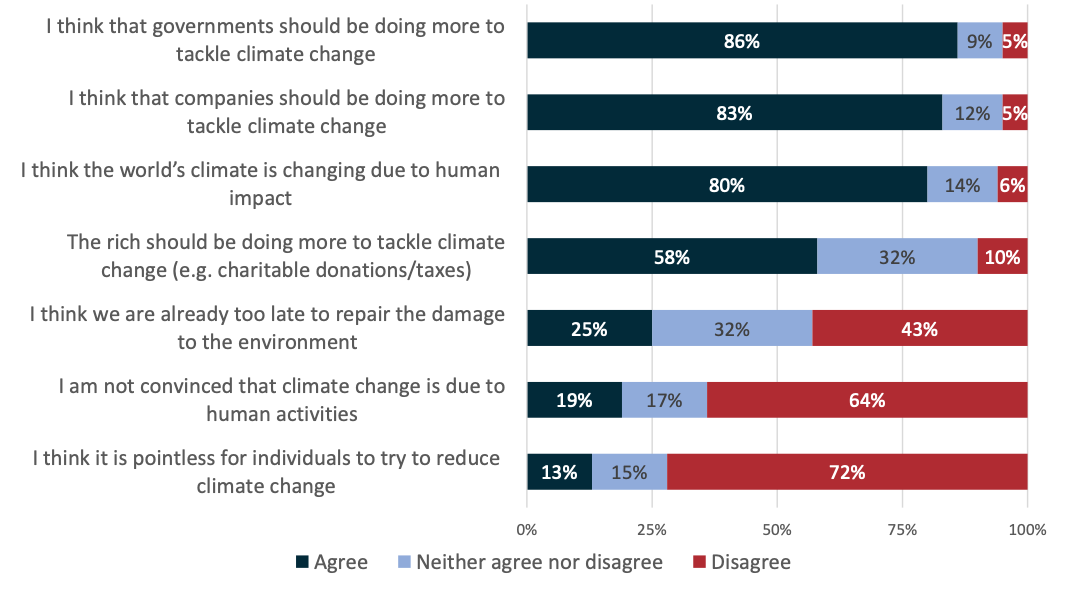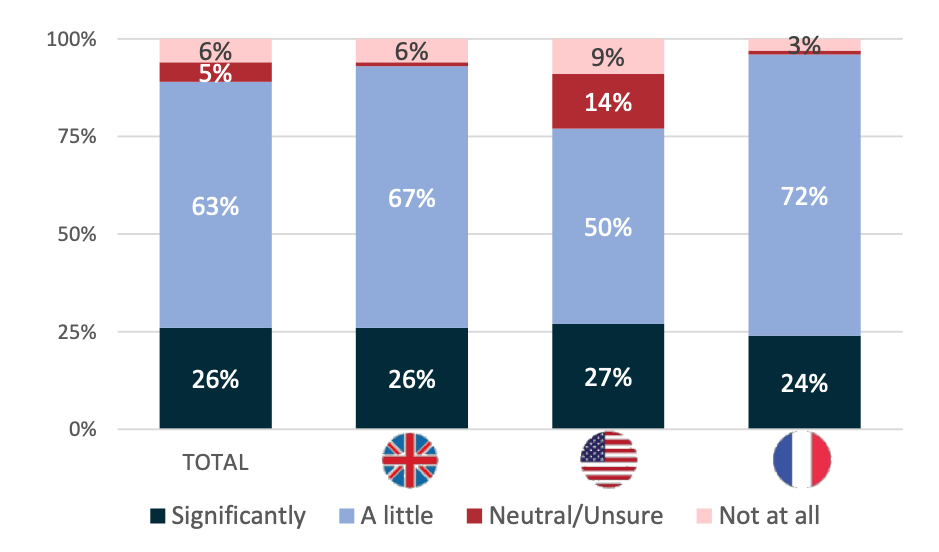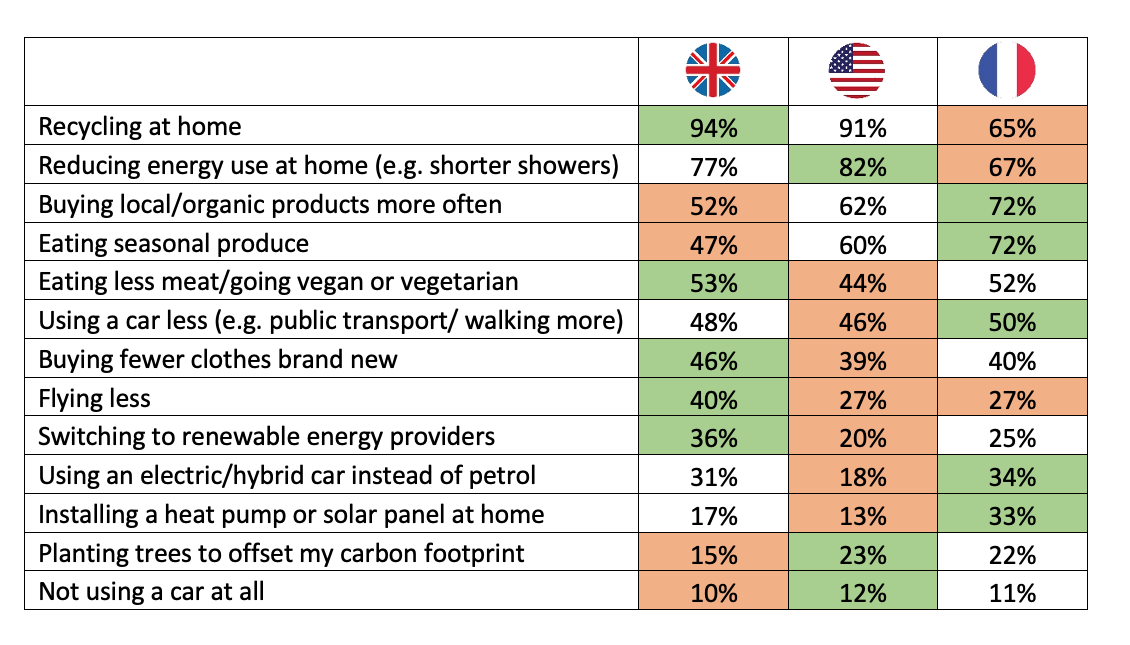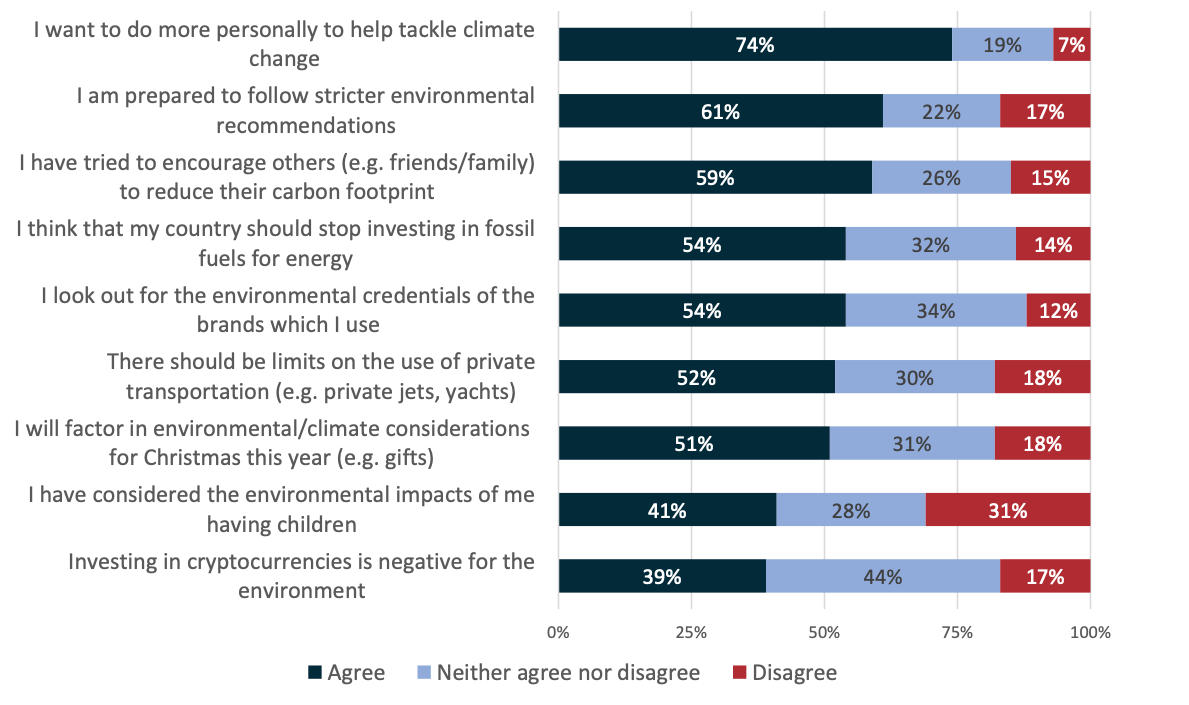Special COP26: Climate Change & The Wealthy
views from affluent & hIGH net worth individuals in US, UK and FRANCE
COP26, Environmental Responsibility and SDGs - Affluent Views on Climate Change - Focus on Industries and Companies
Release date: December 2021
introduction
Climate change is now one of the most urgent and complicated issues facing modern society. As the United Nations Climate Change Conference (COP26) in Glasgow ends, we contacted our panel of validated affluent and High Net Worth Individuals (HNWI) to ask some questions on the subject of climate change. For this research, we interviewed almost 300 respondents in the UK (101), US (100) and France (96). The median annual Household Income (HHI) of the respondents for this survey is over $275K.
This short report is intended to present a snapshot of wealthy individuals’ sentiment on this issue and whether they are already making changes to their own lifestyles accordingly. Direct quotes from these respondents are interspersed throughout.
KEY TAKEAWAYS
65% of affluent/HNWIs think that COP26 will have a positive impact in tackling the climate crisis.
Nine in ten are concerned about climate change and say they are tackling it in their own actions/lifestyle. Recycling and reducing energy use at home are the most common actions.
Three quarters (74%) want to still do more personally, while 61% are prepared to follow stricter environmental recommendations.
Almost half (48%) think that country governments are the most responsible for tackling climate change, followed by International Organisations such as the United Nations then Businesses and Individuals at an equal level.
COP26, Environmental Responsibility and SDGs
Cautious optimism about COP26
With COP26 drawing to a close, there will be scrutiny in the coming months about how effective the conference has been as a means of tackling climate change. There has been some criticism and protests about the ways delegates travelled to and from Glasgow and the non-attendance of countries such as Russia and China, which has led to questions being raised about how much impact the event will have.
Despite a certain level of pessimism - See affluent and HNW respondents’ quotes below - we found a reasonable level of optimism among our respondents that the conference would instigate at least some positive change. While only 10% felt there would be significant change, 55% felt there would be some positive change (either little or not very much). Just over a quarter was unsure and only 7% adopted a clearly pessimistic position and felt that there would be no significant change. Interestingly, Brits are the most optimistic of the three countries, although, for the most part, this is tempered by them expecting only a limited amount of positive change.
“And to what extent do you believe that COP26 will bring about change to tackle the climate crisis?”
Figure 1: Confidence in COP26
Base: 297 affluent/HNWIs Source: LuxuryOpinions®/Altiant
In their own words...
“It’s all a little hypocritical when these large organisations flaunt their wealth and fly around the world in private jets and driving gas-guzzling cars. So whilst we all think we do a bit, we also do damage too. Everyone is as bad as each other.” 45-54y old American female
***
“There are rows of private jets at the airport and 250’ mega yachts in the harbor. It is so hypocritical.” 55-64y old British male
Much of the discussion at COP26 has related to who is responsible for tackling climate change. While a combination of organisations and individuals will be required, it is clear that wealthy respondents see country governments as having the primary responsibility. 78% believe that governments are either the most, or second most important, for doing so. This is far above any other type of organisation or business. Only 26% think that individuals themselves are the most, or second most important, people in tackling climate change.
“Please rank from most to least important who you think should have responsibility for tackling climate change?”
Figure 2: Responsibilities for tackling climate change (total sample)
Base: 279 affluent/HNWIs who agree that the world’s climate is changing due to human impact. Source: LuxuryOpinions®/Altiant
The wealthy think that more can be done
The British Prime Minister, Boris Johnson, said the world is now “one minute to midnight” over tackling climate change and there is some agreement with this view among our respondents: 43% think that it is not yet too late to repair the damage to the environment. A third are unsure while a quarter think that it is already too late. As seen above, individuals are looking for governments and companies to take the lead on this issue, with the majority of respondents thinking that these organisations should be doing more to tackle climate change (86% and 83%, respectively). The French are the least likely to see individuals as important, with almost half thinking they are the least important (compared to 37% of Americans and just 29% of Brits).
“Do you agree or disagree with the following statements?”
Figure 3: Attitudes towards climate change (1)
Base: 297 affluent/HNWIs Source: LuxuryOpinions®/Altiant
Nevertheless, it is clear that individuals have a role to play themselves: 80% think that the world’s climate is changing due to human impact, while only 13% think that it is pointless for individuals to try to reduce climate change (falling to just 6% of Brits). Furthermore, the wealthiest individuals in society feel they should in fact be doing more themselves such as making charitable donations or paying more taxes (58%).
In their own words...
“Everyone needs to take action from government through to the individual. We are in this together but need commitment from all, especially politicians, who still seem to be more interested in their own success and egos than future of the planet.” 45-54y old American male
***
“Climate change is the responsibility of all of us as individuals.” 35-44y old American male
***
“Everyone’s own actions can help minimise the impact of climate change and preserve the Earth and its resources.” 45-54y old French female
‘Tackling climate change’ is one of the U.N.’s top 3 Sustainable Development Goals
Organisations such as the United Nations, which organises COP26, evidently also have a key role to play. In 2015, it established 17 linked global goals which aimed to be a “blueprint to achieve a better and more sustainable future for all by 2030”. Our respondents were asked to select which of the 17 goals were the most important to them.
Somewhat surprisingly, climate action only comes in in second place, with a third citing it as one of the top 3 goals. This figure peaks among wealthy Brits (41%) but falls to just 21% of Americans. Clean water and sanitation is in fact the leading factor at 41%, although only cited by 27% of affluent French individuals. The other main factor is to eliminate global hunger (31%), with affordable/clean energy (26%) and ending poverty (22%) rounding out the top five.
“Please select what you think are the three most important sustainable development goals (SDGs) to transform our world established by the United Nations as a part of the roadmap to 2030.” [% top 3 mentions, top 5 goals]
Figure 4: Views of the most important SDGs
Base: 297 affluent/HNWIs Source: LuxuryOpinions®/Altiant
Wealthy individuals' personal views on climate change
A high level of concern about climate change
Wealthy countries and individuals are often cited as being among the main contributors to the climate change crisis. According to a new report by the Institute for European Environmental Policy and Oxfam, the world’s richest 1% (equating to earning more than $172,000 annually) are said to produce 15% of the world’s carbon emissions. This is twice the combined impact of the poorest 50%. Furthermore, the International Energy Agency has estimated that the latest net zero targets will keep global warming to 1.8C, but many feel that this level will be exceeded.
Criticism of the world’s richest claims that most of these individuals are only interested in their own lives, and do not have any consideration for wider societal issues such as environmental protection. However, our panel of wealthy individuals can be seen to share the same concerns on this issue as the wider population. Across the total sample, 45% say that they are very concerned about climate change, with a further 44% being somewhat concerned. Only 8% say that they are unconcerned. American respondents are a little less worried than the other two countries studied, with only two thirds (69%) being concerned.
“How concerned are you personally about climate change?”
Figure 5: Affluent/HNWIs concern about climate change
Base: 297 affluent/HNWIs Source: LuxuryOpinions®/Altiant
Personal lifestyle changes
Given this high level of concern about climate change, it is unsurprising that wealthy individuals are already tackling the issue in their own actions and lifestyle. A quarter (26%) say that they are significantly doing so, with a further 63% doing so a little. Only 6% are not making any efforts at all on this front. The results are broadly similar across the three countries although Americans again fall slightly behind the French and British in tackling climate change in their lifestyles.
“To what extent do you think you are now tackling climate change in your own actions/lifestyle?”
Figure 6: Affluent/HNWIs approach to tackling climate change
Base: 297 affluent/HNWIs Source: LuxuryOpinions®/Altiant
When it comes to how they are reducing their impact, many wealthy individuals are already taking simple steps at home such as recycling (83%) and reducing their energy use (75%). These small steps, if scaled up to the overall population, can have a significant impact on reducing carbon emissions. Food is also a clear part of these efforts, with seasonal and local produce becoming more attractive to three in five, while half say that they are eating less meat, or none at all. A reduction in methane gas, the clearing of land/deforestation for grazing and the health benefits of eating less/no meat are all driving this trend in reduced meat consumption and growing in plant-based diets.
There is also a clear effort being made to reduce the use of personal transport. Almost half (48%) say that they are using a car less, while 11% are not using one at all. With a quarter now using an electric/hybrid car instead of petrol/diesel and 32% flying less, there are clear attempts being made to reduce carbon footprints via transportation. The recent growth in online meetings and conference should continue as many people look to eliminate unnecessary travel.
“Which of the following, if any, are you doing to reduce your own impact on the environment?” [select all that apply]
Figure 7: Actions in reducing personal environmental impact
Base: 263 affluent/HNWIs who say they are tackling climate change in actions/lifestyle Source: LuxuryOpinions®/Altiant
When we look at these results by country level, there is quite a high level of variance. These are summarised below:
Most likely to: recycle at home, eat less/no meat, buy fewer clothes brand new, fly less and switch to renewable energy providers.
Least likely to: buy local/organic products more often, eat seasonal produce, plant trees to offset their carbon footprint and to go car-free.
Most likely to: reduce energy use at home, plant trees to offset their carbon footprint and to go car-free.
Least likely to: eat meat less/not at all, cut back on car use or use an electric/hybrid vehicle, fly less, buy fewer clothes brand new, switch to renewable energy providers and use a heat pump/solar panels at home.
Most likely to: buy local/organic products more often, eat seasonal produce, cut back on car use, use an electric/hybrid vehicle and use a heat pump/solar panels at home.
Least likely to: recycle at home, reduce energy use at home and cut back on flying.
“Which of the following, if any, are you doing to reduce your own impact on the environment?” [select all that apply]
Figure 8: Actions in reducing personal environmental impact, by country
Base: 263 affluent/HNWIs who say they are tackling climate change in actions/lifestyle Source: LuxuryOpinions®/Altiant
Financial changes are also being made
Wealthy individuals are also looking to make changes financially to take account of climate considerations. Almost half (48%) say they have donated to organisations/charities, while 28% have donated to environmental/climate research. Americans are comfortably the most likely of the three countries to have done so. Wealthy individuals are also thinking about their investments: 41% are investing in green funds or ‘green’ wealth management companies, while 40% are considering how green their investments currently are (with French respondents lagging behind their American and British counterparts on both of these metrics).
“And specifically relating to finance, which of the following, if any, are you doing to reduce your carbon footprint?” [select all that apply]
Figure 9: Financial actions in reducing personal carbon footprint
Base: 263 affluent/HNWIs who say they are tackling climate change in actions/lifestyle Source: LuxuryOpinions®/Altiant
Cryptocurrencies such as Bitcoin reached a new highpoint this week and remain popular with many wealthy individuals. However, there is growing concern about how clean these currencies are: for example, a report by CNBC found that Bitcoin mining accounts for about 36 million tons of carbon dioxide emissions each year, about the same amount as New Zealand. Two in five (39%) wealthy respondents agree that cryptocurrencies are negative for the environment, which may lead to further legislation in the coming years (see chart below).
Further attitudes towards climate change
We have so far seen how wealthy individuals are looking for their government and companies to take the lead on climate change. However, many are also willing to make changes themselves: almost three quarters want to do more personally to tackle climate change while 59% are trying to encourage others to reduce their carbon footprint. They are also often willing to make sacrifices and fundamental changes to their lifestyle to meet this goal, whether that is by following stricter environmental recommendations (61%), considering environmental factors for celebrations such as Christmas (51%) or even when planning a family (41%, and rising to 55% among the French).
In their own words...
“Education is key. My educated children do not want to bring life into the world because they are afraid the children will suffer the consequences due to global warming and climate change in a severe manner.” 45-54y British female
***
One growth industry over the past 18 months has been the use of private transportation. As wealthy individuals looked to distance themselves from the threat of Covid-19, private jets and yachts became more attractive. However, these are now being criticised for clashing with environmental goals and this may deter the climate conscious from wanting to buy or even use them. More than half (52%) think that there should be limits on the use of private transportation, peaking among the French at 60% (but falling to just 39% of Americans). This may be an area of increasing legislation and restrictions in the coming years as climate targets are attempted to be adhered to.
“Do you agree or disagree with the following statements?”
Figure 10: Attitudes towards climate change (2)
Base: 297 affluent/HNWIs Source: LuxuryOpinions®/Altiant
Focus on industries and companies
In their own words...
“Are there any industries which you think are particularly bad for the environment? Why?”
Certain industries such as fossil fuels, fashion and travel have been pinpointed in the media for being particularly bad for the environment. These were also often identified by respondents in our survey, but some took a more overarching view of the negative influences:
“Anything or any industry that perpetuates single-use plastics or the use of fossil fuels.” 45-54y old British female
***
“Not one in particular. Everyone plays a part.” 45-54y old British female
***
“The companies producing trinkets for festivals, stuffed animals, toys, fast fashion, dollar store items, paper plates, styrofoam items, gas guzzling automobiles, and the list is endless.” 45-54y American female
***
“Any industry that uses any kind of energy that is not renewable. Any industry that uses by-products of the petrochemical production of energy, e.g. a clothing manufacturer should not use any plastic of any kind, and should and use recycled wool, cotton, and other natural fabrics to make their clothes. We should be switching faster to a 100% plant based food supply, and also away from having packaged food products. Food companies and stores should use zero plastic in production, manufacture, and sale of foods of all kinds. I read that the clothing industry is terrible for the environment. I cannot stand the rows and rows of plastic containers in my supermarket holding fresh fruit. Our ancestors did very well 100, 200 years ago. We need to go back to many of their ways. It is SO easy to change. Only ignorance, laziness, and greed are stopping the change.” 45-54y old British female
***
“Many industries are still bad for the environment because they emit carbon dioxide. 45-54y old French female
***
“Fashion: barely-worn cheap clothes going to landfill. Food retailing: produce flown all over the world and use of plastic packaging.” 45-54y old American male
***
“Those that manufacture and sell fossil fuels and machinery that relies on it, products that use palm oil and agriculture that encourages deforestation and companies that use excessive packaging and/or non recycle packaging.” 45-54y old American female
“And are there any luxury brands/companies which stand out for having particularly strong environmental credentials?”
Clear and credible environmental principles have now moved to become an essential part of many brands’ strategies. Consumer sentiment shows that many individuals are now actively seeking out trustworthy and reliable environmental messages from brands. As seen in the previous chart, 54% of our sample say that they are now doing this and brands which have a poorly defined or vague environmental position risk being left behind.
A few brands such as Chanel, Gucci, Tesla and Stella McCartney stood out for their environmental credentials, but there was also some scepticism from respondents. The onus is on brands to be transparent and honest with their environmental claims and schemes such as Positive Luxury’s ‘Butterfly Mark’ can be an effective way to build customer trust.
“I would like more companies to communicate more strongly and clearly to customers what action they are taking to combat climate change to make it easier for customers to make ‘the right choice’ should they wish to do so.” 45-54y old American female
***
“Many fast fashion companies are changing policies but they over produce and it costs the poor people in the supply chain. Ultimately we must learn to wait to buy new, we must buy less and better.” 45-54y old American female
***
“Those that claim to be so are probably pandering to environmental protests and are carrying out greenwashing policies.” Over-65y old American male
***
“Reformation seems great. Selfridges has started saying which brands are eco-friendly when searching for products but all of this can seem like greenwashing when you consider that all consumption is making things worse.” Under-25y old American female
Other Selected Quotes on Climate Change...
“We must change and be patient and learn to wait for things. We must look at what we can do and take the time to educate ourselves. At Christmas how can we reduce the impact? Perhaps we will purchase a Sustainable Christmas tree, look into the best environmentally friendly options. Perhaps looking into sustainability when it comes to golfing, environmentally-friendly hotels etc. We must learn about all available options.” 45-55y old American female
***
“Education, education, education to make people realise each and everyone of us need to change.” 55-64y old American male
***
“Establish a universal logo so consumers know they are making a good choice when shopping at a retailer with this logo.” 45-54y old British male
***
“I am very worried about climate change but at the same time don’t feel like I can personally go much about it. So I don’t see the point in curtailing my lifestyle when it will have zero impact. The big things seem to need a global effort to reduce fossil fuel consumption. I think China and India have a big role to play here. More investment in alternative technology is needed: can we have hydrogen or electric planes please?!” Under-25y old American female
***
“It’s very easy to feel disheartened but I believe in the power of positive action which I try to apply in every aspect of my life (from consumption to investments).” 35-44y old American female
To view the data set in full, or speak to us about any of your luxury research requirements, please email us at contact@altiant.com.
Contributors
Chris Wisson, Knowledge Director
Meryam Schneider, VP
Ivelina Dobreva, Project Manager
Contact
reports@altiant.com
ABOUT ALTIANT
Altiant is a specialised fieldwork company which enables large scale, global research among affluent consumers/High Net Worth Individuals (HNWIs) in 15+ countries worldwide.
By servicing dozens of the world’s top luxury and wealth brands, Altiant helps renowned brands and their research agencies to answer critical questions among this very hard-to-reach demographic. We ensure that all of our survey respondents are genuinely affluent by having their identities verified and wealth levels validated.
Altiant is a corporate member of ESOMAR, the World’s leading association for standards & Ethics within market research. Altiant adheres to, and abids by their strict guidelines governing the best practice in the industry.
Publications contained in the Altiant Knowledge Center are free to use, we simply require proper attribution. In no event shall Altiant be liable for any indirect, special or consequential damages in connection with any use of the provided data. Altiant does prohibit the selling of any information contained within or derived from these reports and monitors.
















